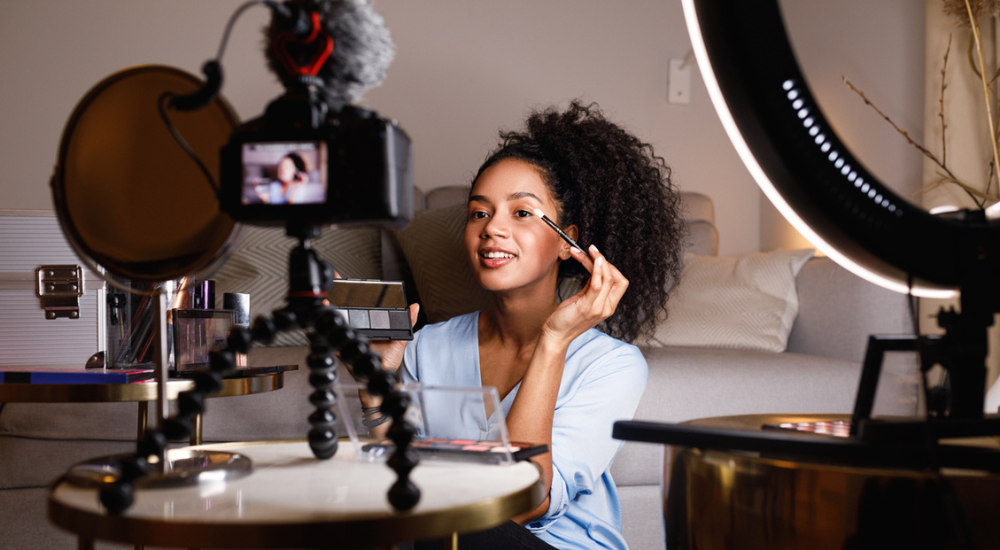The Australian Therapeutic Goods Administration (TGA) recently released a new code designed to regulate the promotion and advertising of therapeutic products. The code states that influencers can no longer use personal testimonials when advertising products. Shania O’Brien speaks to beauty influencer Shahrzad Kahrobai about the change and breaks down what it really means for the industry.
People often look to celebrities and influencers for guidance on what to wear, what trends are in, and most importantly: what products to use. It is almost second nature to look up your favourite internet personality on TikTok or Instagram, to scroll through their content until you find a video titled ‘Get Ready With Me’ or ‘This Is My Nighttime Routine.’
Expressed in numbers, 48% of the world is on some form of social media, and 54% of those people use online platforms to follow their favourite celebrities, browse websites, and make purchasing decisions. And companies have been taking significant advantage of these statistics, focusing on influencer marketing.
Research has found that at least 30% of people are influenced by celebrity endorsements and are more likely to consume brands they recognise if a celebrity they look up to personally champions a product. This happens because elements of the celebrity and the brand reflect onto each other and combine; many would recognise Kendall Jenner as the face of Estée Lauder and Naomi Campbell as the brand ambassador for Pat McGrath.
The Australian Therapeutic Goods Administration (TGA) recently released a new code designed to regulate the promotion and advertising of therapeutic products. The code came into effect on 1 January 2022, but there is a six-month transition period so the deadline for ensuring compliance with the code was 30 June 2022 — which is when it officially came into effect all over Australia. Essentially, the code sets out requirements for the promotion of therapeutic goods such as cosmeceuticals, sunscreen, medical devices, vitamins, to ensure that such advertising will promote quality use of the products, is socially responsible, and will not mislead or deceive customers.
Hence, the new code is a positive step from the TGA taken to protect consumers — not to ban influencers from promoting products. Testimonials are not permitted by those involved in the production, sale, supply, or marketing of the goods, so no one who directly stands to profit from the product’s success is allowed to provide positive attestation to the quality of the product.
Businesses make an average of $5.20 for every dollar they spend on influencer marketing, a rate that is only projected to go up with the emphasis on people being increasingly online due to various factors such as lockdowns, isolation, scrolling on social media while waiting for an email to come in, and whatnot.
When the code was first announced in December 2021, there was a severe degree of misinformation being spread regarding what changes were actually being made. In clear terms, the code governs paid and gifted testimonials and bans influencers from providing paid testimonials in return for cash or samples — it does not ban them from endorsing or promoting a product in exchange for money or gifts. It simply limits the health advice they can give as they are (usually) unqualified to give health advice.
It is presently required for influencers to declare when their content is paid, such as by using hashtags like #ad or #paidpartnership, the only extra thing they will need to follow from now is refrain from posting personal testimonials about how the product has worked for them.
This was introduced because the TGA wants to ensure the health and safety of all consumers, and to make brands adhere to higher ethical standards that require them to focus on the quality of the product
rather than the strength of the testimonial. Additionally, unrealistic claims have also been known to cause distress among consumers when products they purchase do not work in the exact manner as an influencer claimed it would — for example, an eye cream not getting rid of all fine lines immediately or using a nail hardener and still struggling with brittle nails.
However, it is important to note that the TGA is not responsible for brands that do not claim to offer health benefits.
According to the TGA, a ‘testimonial’ refers to when “an individual has testified to the outcomes they experienced from the use of the therapeutic good. An endorsement, on the other hand, is made where an individual approves of a particular therapeutic good, but there is no indication as to the outcomes from the use of the good.” Hence, it’s okay for an influencer to partner with a company and post about the product, they just cannot claim to have experienced specific results from it such as that it “significantly reduced redness” or “cleared all fine lines” from their face; or post ‘before’ and ‘after’ shots of using a certain product as there is no proof that the results are genuine.
Advertisers, including influencers, who do not comply risk committing an offence under section 42DM of the Therapeutic Goods Act 1989 or breaching the civil penalty provision in section 42DMA, each of which could attract significant penalties.
It is extremely unlikely that brands will reduce their investments in influencer marketing because of this, as the expected industry valuation at the end of 2022 is $16.4 billion. The code does not affect reviews and posts from people who have not been incentivised — so if a consumer just really, really enjoyed a product, they are free to post all the personal testimonials they desire.
However, the TGA was clear about the brand’s responsibility under the new code: “Business owners are responsible for the content of any social media page created or managed by them, including websites, social media channels, blog posts, hashtags, or discussion forums.”
They added, “This responsibility extends to user-generated content, such as third-party comments posted on those social media platforms that are controlled by the business.”
Hence, all advertising for therapeutic goods must promote the safe and responsible use of those products and must not take advantage of consumers, including through third party comments on social media.
Professional Beauty spoke with influencer Shahrzad Kahrobai — better known as TheSpotBeauty — about the updated TGA law in order to get a sense of how it will affect her and her work. Shahrzad mainly focuses on eco-conscious products, sustainable beauty, and wellness. She has previously worked with brands such as Biossance, Synergie Skin, and MŪN Skincare.
“I’m passionate about holistic healing and try to adopt a more plant-based approach when it comes to my wellness and beauty,” she told PB. Shahrzad has also been a judge for eco, organic, and sustainable beauty and wellness products for the last four years internationally and in Australia, such as the Clean + Conscious Beauty Awards, the Beauty Shortlist Awards, and the Clean Certification Awards.

When asked about how she thought the TGA laws would affect her specifically, she said: “I think the TGA laws will have an effect on some of my content. I also feel that the new changes may put a pause on certain campaigns as some brands may choose not to work with influencers because of this.”
She added, “I also feel that these changes may not warrant an influencer’s opinion or results, something that in the past was quite important.”
While the updated law calls for more clarity and more accountability in terms of how a product functions, Shahrzad believes there will be ramifications on the influencer marketing industry as a whole.
“Brands will change their approach on how they advertise and market certain products due to the new TGA laws,” she said. “Influencers will also adopt a different approach to make sure they meet the new guidelines, for example, the sharing of our opinions and results will now change because of this.”
“But there will always be a place for trusted influencers in the industry,” she added. And while there are always roadblocks, the opportunity to grow above and beyond them has never presented itself more clearly.
The change means that the laws are no longer different for influencers and more traditional types of advertisement such as television — everyone and all formats are now subject to the same rules and regulations. This will increase the level of trust consumers place in social media marketing and advertising, and it will slowly gnaw away at the fear that the famous influencer is misleading the public about a product they do not even use.
Existing research on such forms of marketing have identified that identification with the endorser and their perceived credibility both play a significant role in endorsement marketing; hence the updated laws only stand to increase the public’s trust in influencers as their content can no longer be labelled exaggerated for promotional purposes. In fact, it can also be argued that the regulation is a sign of the growth in the influencer industry and its success as a mainstream marketing tool.
This article originally appears in the July-August 2022 print issue of Professional Beauty.
Read the current issue of our digital magazine here:
- For more news and updates, subscribe to our weekly newsletter
- Follow us on Instagram
- Like us on Facebook
- Join Australia’s largest network of beauty industry professionals on LinkedIn
- Subscribe to our print magazine
Have an idea for a story or want to see a topic covered on our site and in our pages? Get in touch at info@professionalbeauty.com.au.

